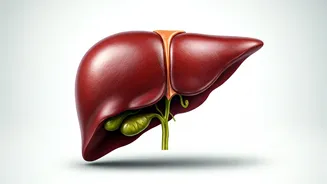Liver Disease: A Threat
Liver disease is a significant health issue, and its prevalence might surprise many. Often, people are unaware of the underlying issues affecting their
liver until serious complications arise. One such complication is Overt Hepatic Encephalopathy (OHE), a severe condition that can develop if chronic liver disease goes unchecked. OHE directly impacts the brain, resulting in potentially debilitating cognitive and neurological impairments. The article underscores the importance of recognizing the signs of liver disease early on, such as jaundice (yellowing of the skin and eyes), fatigue, abdominal pain, and swelling. Timely medical attention is critical to prevent the progression of liver damage and avoid complications like OHE. Furthermore, it's crucial to adopt a proactive approach to liver health, which includes a balanced diet, regular exercise, and avoiding excessive alcohol consumption.
What is OHE?
Overt Hepatic Encephalopathy, or OHE, is a severe neurological complication that arises from advanced liver disease. It occurs when the liver's ability to filter toxins from the bloodstream is severely compromised. The liver normally removes harmful substances, but when it fails, these toxins accumulate and impact the brain. The buildup of ammonia, a byproduct of protein digestion, is a key factor in OHE's development. Symptoms of OHE can range from subtle cognitive changes, like forgetfulness and difficulty concentrating, to more severe neurological problems, such as confusion, disorientation, and even coma. In severe cases, OHE can lead to significant changes in behavior, personality shifts, and impaired motor skills. Regular medical checkups and diagnostic tests are essential for detecting and managing liver disease, reducing the risk of developing OHE.
Managing OHE Effectively
The management of Overt Hepatic Encephalopathy involves a multifaceted approach, usually under the guidance of a gastroenterologist. The primary aim of treatment is to reduce the level of toxins in the body, particularly ammonia. Medications like lactulose are commonly prescribed to help trap ammonia in the gut and eliminate it through bowel movements. Dietary modifications are also crucial; this often involves limiting protein intake to reduce ammonia production. Another important aspect of treatment is addressing any underlying causes of liver disease. This could include antiviral therapies for hepatitis or abstinence from alcohol in cases of alcoholic liver disease. Liver transplantation remains a treatment option for people with severe liver failure and OHE. Regular monitoring is key, and the treatment plan will be adjusted based on the individual's response and the progression of the condition. Early intervention and consistent management offer the best chance of slowing the progression of liver disease and improving the quality of life.


















